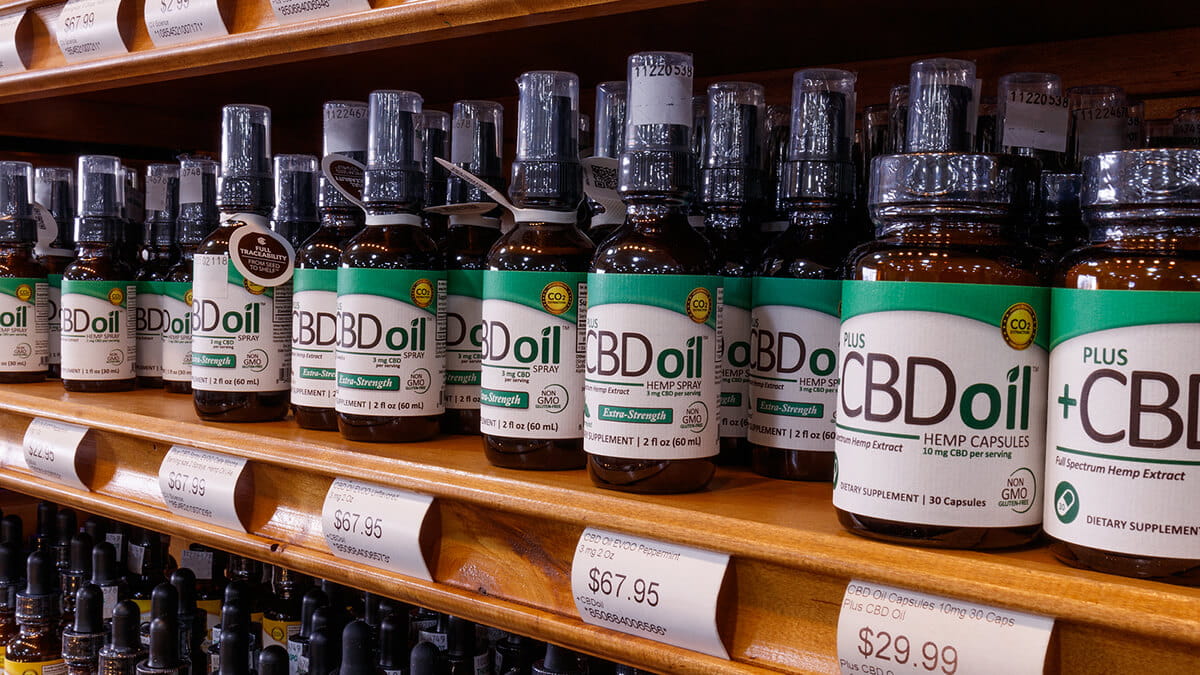It seems like cannabidiol (CBD) is everywhere lately—from foods to cosmetics to pet products. But what exactly is CBD, and why is it surrounded by controversy? Most importantly, is it safe? In the court of public opinion, answers vary. But when it comes to public health, studies provide more insight into the chemical increasingly being used for medical treatments and consumer products alike. Here are a few things about CBD that public health professionals want you to know.
1. CBD—short for cannabidiol—is derived from cannabis.
Cannabis is not synonymous with marijuana. Rather, marijuana—as well as hemp—are forms of cannabis. CBD is found in both marijuana and hemp and is the second most prevalent active ingredient in cannabis.1 The most active ingredient is tetrahydrocannabinol (THC), which is probably the compound you learned more about in your health education classes.
To put it simply, THC gets you high—CBD does not. That’s because CBD is naturally non-intoxicating, and though it causes feelings of relaxation, it does not present the mood-altering effects of THC. In fact, CBD counteracts the effects of THC, which is why the compound appears more frequently in various products, including food and dietary supplements.
2. The legal status of CBD is … complicated.
CBD doesn’t get you high, so that means it’s legal … right? Kind of. In the U.S., CBD derived from hemp that contains .3% of THC or less is technically legal with the passing of the 2018 Farm Bill. This legislation puts no restrictions on the sale, transport, or possession of hemp-derived products, so long as those items are produced in a manner consistent with the law.2 However, marijuana-derived CBD is classified as a Schedule I controlled substance—a categorization that denotes a substance is believed to have a high potential for abuse.
And while several countries have modified their national controls to accommodate CBD as a medical product, the U.S. still defers to state-by-state regulations and restrictions. At the federal level, the Food and Drug Administration (FDA) has only approved one cannabis-derived and three cannabis-related drugs for treatment of medical conditions, available by prescription only.3 The World Health Organization (WHO), however, has recommended rescheduling CBD since it does not induce physical dependence and is not associated with abuse potential.4 To date, the drug approval process for CBD is ongoing, despite the assertions of many public health professionals and community health workers on its safety and benefits.
3. CBD has numerous medical benefits as well as side effects.
Preliminary testing has shown that CBD has several beneficial medical applications. For instance, CBD was found to be effective in the treatment of Alzheimer’s disease, cancer, psychosis, Parkinson’s disease, and other serious conditions. The compound is believed to be particularly successful in treating seizures associated with epilepsy as well as Lennox-Gastaut syndrome or Dravet syndrome. Because of this, the FDA approved Epidiolex, a seizure medication containing a purified form of the drug.5
CBD is also touted for its therapeutic properties and treatment of anxiety disorders and chronic pain. And though it is well-tolerated, public health professionals also note the side effects CBD can carry, such as reduced appetite, dry mouth, and drowsiness and fatigue. Like most drugs, it can also potentially interact with other medications you may be taking, particularly blood thinners.
4. It is difficult to know what you’re getting.
Because CBD falls into a relatively grey legal area in the U.S., regulations aren’t consistently enforced or followed. In fact, a recent study showed that of 84 CBD products bought online, over a quarter contained less CBD than advertised. What’s worse is that 18 of these products contained THC.5 Not only is this a violation of the law, it can also put patients at risk since these products are not FDA-approved. This means that CBD products being sold—especially online—have not been proven to be safe or effective.
5. Ultimately, more research is needed.
One thing public health professionals and community health workers alike can agree on is that more research needs to be conducted on the possible benefits and potential pitfalls of CBD. And as health education continues to advance, there are plenty of high-quality public health programs that can give you the tools you need to contribute to the growing community of medical professionals conducting research to further global health.
With Walden University’s Master of Public Health program, you can explore a curriculum featuring case studies on the latest public health issues in a cutting-edge online environment. Whether you want to conduct research, design and implement health programs, develop public health policy, or administer public health services, Walden’s MPH degree program can give you the expertise you need to advance your career. Online education makes it more convenient than ever to earn your degree, because you have the power to take your classes at whatever time of day works best for you from wherever you have internet access.
Walden University is an accredited institution offering a suite of public health degree programs as well as an MS in Health Education and Promotion online. Expand your career options and earn your degree in a convenient, flexible format that fits your busy life.
1Source: www.health.harvard.edu/blog/cannabidiol-cbd-what-we-know-and-what-we-dont-2018082414476
2Source: www.brookings.edu/blog/fixgov/2018/12/14/the-farm-bill-hemp-and-cbd-explainer
3Source: www.fda.gov/news-events/public-health-focus/fda-regulation-cannabis-and-cannabis-derived-products-questions-and-answers
4Source: www.forbes.com/sites/tomangell/2019/02/01/world-health-organization-recommends-rescheduling-marijuana-under-international-treaties/#75d1a1f16bcc
5Source: www.mayoclinic.org/healthy-lifestyle/consumer-health/expert-answers/is-cbd-safe-and-effective/faq-20446700
Walden University is accredited by The Higher Learning Commission, www.hlcommission.org.




